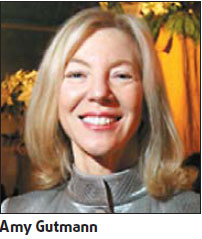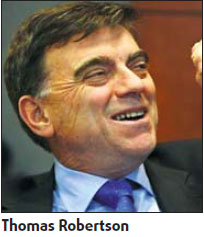

An economic crisis is a terrible thing to waste is what some investors are saying. And the University of Pennsylvania (Penn) and its prestigious Wharton Business School in the United States are also repeating the mantra to make the best out of bad times.
A strong footing

Like the ailing financial institutions, US universities and colleges are also feeling the pinch of the financial turmoil. State governments in Arizona, Hawaii and California are cutting education spending. Meanwhile, endowments of the universities have shrunk with the falling share prices.
For example, Harvard University saw the value of its endowment fund shrink by 22 percent or $8 billion from July to October, its president Drew Faust wrote in a letter to school deans.
The financial woes have forced some US universities to begin hiring freezes and some others are also considering reducing student aid. But that's not the case at Penn.
"We entered the current financial crisis in a very strong footing," Amy Gutmann, the university's president said earlier this month in Beijing. Gutmann came to sign an agreement between Penn and Beijing's Tsinghua University to expand their ongoing academic and research collaboration.
In October 2007, Penn launched a five-year, $3.5 billion fundraising effort to support the university's priorities to expand student financial aid, strengthen faculty endowment and improve the school environment for teaching, research and student living. It raised a record $600 million in the first year and has already reached more than half of the target.
Meanwhile, the loss of the university's endowment, which accounts for one third of its budgets, is much less than others. According to Gutmann, more than 50 percent the university's endowments were put in low-risk treasury bonds and cash equivalents, which were less affected by the dive in the stock market.
Although Gutmann said the university would tighten the belt administratively, she has no plan to reduce its student aid and might even use the current downturn to attract top scholars.
"We are budgeting for a significant increase in financial aid," said Gutmann. "One reason is to compete for the best students."
According to Gutmann, the school is going to spend more for financial aid, which will allow it to attract the best students. And $350 million out of the school's fund-raising campaign will go to undergraduate financial aid.
Moreover, it would also look to further expand its cooperation with universities such as Tsinghua in other nations to "get the most talented minds to work together on the most critical issues".
Penn and Tsinghua will develop a conference on undergraduate education to discuss the best practices and skills development and to identify major research collaboration spearheaded by Penn's School of Engineering and Applied Science.
Meanwhile, the US university is also allying with Shanghai Jiao Tong University to establish a jointly sponsored conference on international financial market regulation with their business and law schools.
Unlike some universities that have chosen to open an international campus, Penn prefers to work with local partners. It also worked with Peking University and Beijing Renming University for exchange programs.
"China is an exciting place," said Gutmann. "Chinese students are important for our diversity."

Wu Yang, a 1995 Wharton graduate, is one of them. He was in the first group of Chinese to pursue MBA degrees in the school. When Wu entered the school in 1993, there were only six Chinese out of the 750 students accepted that year. Now with growing interest in business education in China, the school accepts more than 50 Chinese students each year.
"Wharton is like the West Point for business elites," said Wu. "Before entering the school, we were privates. After that, we were at least majors in the business world."
Wu said what he learned about business and financial issues greatly benefited his later career on the mainland.
Now as the Asian executive board director for the Wharton school, Wu spends a significant amount of his spare time to promote the school in China. In 2005, he helped establish China Knowledge@Wharton, a website that offers Chinese translation of the articles written by Wharton professors.
"China doesn't lack money now, but it's short of high-end talent who know how to mange money better for the country," said Wu. "By helping young talent to get a Wharton education, I also contribute to the nation's development."
Presently, Penn has more than 1,000 alumni in China. And each year, the Wharton school accepts about 50 MBA students from the nation while it also runs executive training programs with Chinese government and enterprises.
For example, the Wharton Financial Institution is now cooperating with Goldman Sachs Foundation to offer training to all Chinese Stock Exchange CEOs. In the past four years, the program has taught 125 high-level securities executives for three-month sessions at the Wharton School.
Intellectual challenge
"The current crisis is also an intellectual challenge," said Gutmann. "Although we don't welcome the financial crisis, we welcome intellectual challenge."
Shortly after the bankruptcy of Lehman Brothers, faculty from Penn began giving lectures about the crisis that were open to all students. Gutmann herself, a prominent political science scholar on political science, will also give a session on the crisis because the bailout measures also have important political implications.
There are also plans for Wharton to introduce a new course, including political science experts who have studied previous financial meltdowns in South Korea, Japan and Chile, in response to the current economic crisis.
"The question is whether it's just a recession, or whether it represents a break with the past," Thomas Robertson, dean of the Wharton School said of the crisis. "I think most of us believe it represents a break with the past."
(China Daily 01/19/2009 page3)













